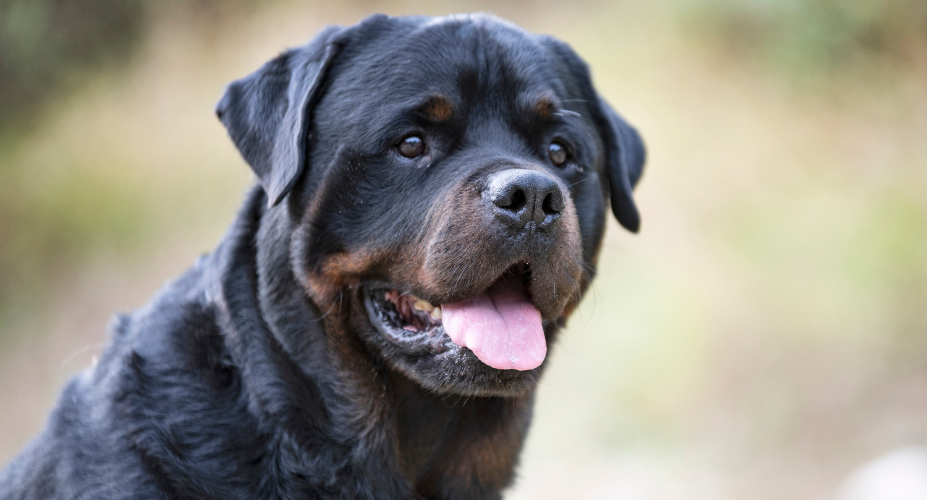Are Rottweilers good with kids? Debunking the Myths
Are Rottweilers good with kids? Debunking the Myths
Are Rottweilers good with kids? is a question often asked by families considering adding a Rottweiler to their household. Its answer is not a simple yes or no, as it largely depends on various factors such as the individual dog's temperament, training, and socialization. Rottweilers, known for their loyalty as well as protective nature, can indeed form deep bonds with children and become gentle, loving family pets when properly trained and socialized from a young age.
However, it's important to note that Rottweilers are a powerful breed with a natural instinct to herd, which can sometimes result in them "bumping" children, potentially causing a toddler to fall.
They may also be cautious around unfamiliar children and can act protectively if they perceive their 'children' are threatened. Therefore, supervision during interactions and teaching children how to respect a Rottweiler's space are crucial for a harmonious relationship
Understanding the Rottweiler Temperament
Rottweilers are a robust breed, known for their strength and loyalty. They are descendants of the mastiffs of the Roman legions, bred for their protective instincts and their ability to work. These dogs are not only physically imposing but also intelligent and energetic, making them excellent working dogs and loyal companions.
Rottweilers are characterized by their calm and confident behavior.
They are courageous but not unduly aggressive, presenting an aloof demeanor to strangers while being affectionate and gentle towards their family. They are very active and smart dogs that can be overly independent. Without guidance, they can develop undesirable behaviors such as digging or nuisance barking.
Rottweilers are well known for their protective nature.
They are powerful, protective, and loyal, famous for their instinct for guarding. They have an inherent desire to protect their family and property, but should never be aggressive toward people without cause. Their protective nature is a result of their breeding history, where they were used to guard livestock and the money of cattlemen.
Rottweilers are also known for their loyalty.
They form strong bonds with their human companions and are willing to go to great lengths to ensure their safety. They are very owner-oriented dogs that want to please and protect their owners. This loyalty makes them extremely protective, always ready to guard their loved ones.
However, it's important to note that Rottweilers require a knowledgeable owner to give consistent training and adequate socialization. These dogs are capable of inflicting damage; thus, they need to be handled with care and respect. They are not a dog for individuals who lack assertiveness or don’t have time to devote to training and socialization.
Rottweilers and Kids: The Reality

Rottweilers, often referred to as "Rotties," are known for their robust and muscular build, their unwavering loyalty, and their protective nature. These traits, combined with their intelligence and strength, make them excellent family pets when properly trained and socialized. However, their interaction with children can be influenced by several factors, including their upbringing, training, and the child's behavior around them.
Rottweilers are generally gentle giants who make excellent companions for the whole family. They are extremely devoted to their families. However, their protective nature can sometimes be directed towards other children if the Rottie perceives them as a threat to their family members. Therefore, it is crucial to supervise your Rottweiler around children and offer redirection when necessary.
Training and socialization play a crucial role in how Rottweilers interact with children.
Early socialization, including exposure to various people, environments, and situations, coupled with positive reinforcement training, can contribute to a well-balanced and well-behaved pet.
Rottweilers are known to be patient animals with a gentle demeanor, making them ideal for handling kids. However, they can be boisterous during playtime, especially when they are young. Therefore, it is essential to train them to play gently.
Rottweilers are large dogs, and their size and strength can pose a risk to small children. They have a natural instinct to herd and can "bump" children to herd them. Due to their size, this "bump" may cause toddlers to fall down and injure themselves. Therefore, it is crucial to supervise interactions between Rottweilers and children, especially young ones, to ensure safety for both.
Children should also be educated on how to interact with dogs. They should be taught to approach and touch dogs respectfully and never to approach a dog while it is sleeping or eating. It is equally important to teach the dog respectful behavior around kids.
Rottweilers are known for their loyalty and protective instincts. When raised with children from a young age, these dogs often develop strong bonds with all family members, including children.
However, they can unintentionally be too rough when playing with children. Therefore, training your Rottweiler to play gently and monitoring their playtime with children is essential.
The Importance of Training and Socialization

Training and socialization are critical components in the development of a Rottweiler's behavior, particularly when it comes to their interactions with children. A well-socialized Rottweiler is more likely to be well-adjusted and confident, capable of forming strong, positive bonds with all family members, including the youngest.
Early Socialization
The role of early socialization cannot be overstated. It involves exposing the Rottweiler to a wide range of people, animals, and environments from a young age. This exposure helps the dog become comfortable and confident in various situations, which is essential for preventing fear-based aggression and anxiety. The critical period for socialization is typically between 8 to 16 weeks of age, where puppies are most receptive to new experiences.
Training Techniques
When we talk about training techniques, positive reinforcement is the gold standard for Rottweilers. This method rewards desired behaviors, which encourages the dog to repeat them. Treats, praise, and affection are all forms of positive reinforcement that can be effective. Operant conditioning, which includes positive reinforcement, negative reinforcement, positive punishment, and negative punishment, is also a successful style of training for Rottweilers, but it's important to focus on positive reinforcement, especially in the beginning.
Consistency is key in training. Establishing a routine and sticking to it helps the Rottweiler understand what is expected of them. Commands such as "stay," "down," and "sit" can be taught through rewards and repetition. It's also important to be patient and maintain a calm demeanor, as Rottweilers respond best to calm and positive guidance.
Training Children
Equally important is training children on how to interact with Rottweilers. Kids should be taught to approach and touch dogs respectfully, avoiding disturbing them while they are sleeping or eating.
Children should also learn to recognize the signs of discomfort in dogs and to give them space when needed. This mutual respect helps prevent misunderstandings and ensures safe interactions between Rottweilers and children.
Safety Measures When Rottweilers Interact with Kids

Ensuring safety when Rottweilers interact with kids is paramount. Despite their potential to be gentle and loving family pets, Rottweilers are a powerful breed, and their interactions with children should always be supervised. Recognizing signs of stress in Rottweilers and teaching children to respect a Rottweiler's space are also crucial aspects of maintaining a safe environment.
Supervision During Interactions
Supervision is the first and most important safety measure when Rottweilers interact with kids. No matter how well-behaved or gentle a Rottweiler may be, they are still large and powerful animals. Their size and strength can pose a risk to small children, especially during playtime. Therefore, an adult should always be present during interactions to ensure that play remains safe and to intervene if necessary.
Recognizing Signs of Stress in Rottweilers
Recognizing signs of stress in Rottweilers is another essential safety measure. Like all dogs, Rottweilers can become stressed or uncomfortable in certain situations. Signs of stress can include excessive panting, yawning, drooling, or avoidance behaviors such as turning away or trying to leave the situation. If a Rottweiler shows signs of stress during interactions with children, it is important to intervene immediately and give the dog some space to relax.
Teaching Children to Respect a Rottweiler's Space
Teaching children to respect a Rottweiler's space is equally important. Children should be taught not to disturb a Rottweiler when it is eating, sleeping, or showing signs of wanting to be alone. They should also be taught to approach Rottweilers gently and to avoid rough play. This respect for a Rottweiler's space can help prevent misunderstandings and potential accidents.
FAQs
How should children interact with Rottweilers?
Children should be taught to approach and touch Rottweilers respectfully, avoiding disturbing them while they are sleeping or eating. They should also learn to recognize the signs of discomfort in dogs and to give them space when needed. This mutual respect helps prevent misunderstandings and ensures safe interactions between Rottweilers and children.
What are the signs of stress in Rottweilers?
Signs of stress in Rottweilers can include excessive panting, yawning, drooling, or avoidance behaviors such as turning away or trying to leave the situation. If a Rottweiler shows signs of stress during interactions with children, it is important to intervene immediately and give the dog some space to relax.
Conclusion
In this comprehensive guide, we have explored the relationship between Rottweilers and children, delving into the temperament of Rottweilers, their interactions with children, and the factors that influence their behavior. We have also discussed the importance of training and socialization, and the safety measures to be taken when Rottweilers interact with kids.
Rottweilers are a robust and loyal breed, known for their protective nature. They can form deep bonds with children and become gentle, loving family pets when properly trained and socialized. However, their size and strength, coupled with their protective instincts, necessitate careful supervision during interactions with children.
Training and socialization play a crucial role in shaping a Rottweiler's behavior. Early socialization, positive reinforcement training, and educating children on how to interact with dogs are key to fostering a harmonious relationship. Recognizing signs of stress in Rottweilers and teaching children to respect a Rottweiler's space are also important for ensuring safety.
Finally, Rottweilers can indeed be good with kids, but it requires commitment to proper training, socialization, and safety measures. With the right approach, Rottweilers can be gentle, protective, and loyal family members, making them a suitable choice for families with children. However, it is essential to remember that every dog is an individual, and their behavior can be influenced by a variety of factors, including their upbringing, training, and the behavior of the children around them.



.jpg)



